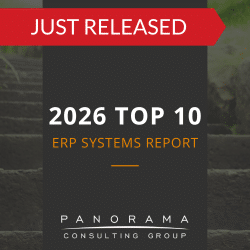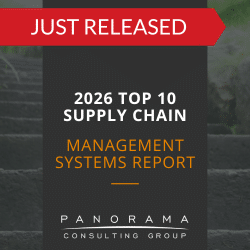- The Fort Collins vs. Open International lawsuit highlights how ERP failures often stem from flawed procurement, poor governance, and misaligned expectations.
- Key breakdowns included rushing vendor selection, unclear success metrics, and weak project oversight—all of which compounded project delays.
- The case reveals deeper ERP project legal risks that apply to both public and private sectors, especially when pressure overrides strategic discipline.
- Executives can mitigate these risks through independent ERP selection, outcome-based vendor management, and early-stage validation of system fit.
ERP project failures can feel abstract—until they happen in your own backyard.
That’s exactly what makes the legal battle between the City of Fort Collins and Open International so compelling. As a Colorado-based firm, Panorama Consulting Group has worked with public and private organizations across the region, and we’ve seen firsthand how quickly an ERP project can go sideways when early decisions don’t hold up under pressure.
While this case study is about the public sector, the ERP project legal risks at play should matter to any executive leading a complex ERP or digital transformation initiative.
When an organization files suit against a software vendor, the dispute often reflects more than just a failed contract. It exposes deeper issues within the procurement process, the governance framework, and the core assumptions that shaped the system’s design.
Today, we’re exploring how project ROI can erode when trust is granted too quickly, communication loses structure, and decisions move forward before the foundation is set.
Contemplating litigation?
We have multiple software expert witnesses available for provision of reports, depositions, and testimonies.
The Case—and What It Says About Municipal Software Project Failure
In 2023, the City of Fort Collins, Colorado filed suit against Open International, a software vendor it had contracted to replace its aging utility billing system. The contract was terminated after years of delays, missed deadlines, and alleged performance issues.
The city claimed that Open International failed to deliver a working system.The vendor countered that the city didn’t fulfill its own obligations. As of this writing, the utility billing software lawsuit remains unresolved.
This is hardly an isolated incident. ERP failures have cost municipalities tens of millions in litigation, operational disruptions, and reputational harm. But Fort Collins is unique in how thoroughly it reflects a pattern we’ve seen before.
Here are five legal and strategic breakdowns this case highlights:
1. Rushing to Select a Vendor
In municipal settings, where procurement cycles are rigid and political oversight adds urgency, rushed evaluations are common. Unfortunately, without this due diligence, even the best-looking platform can fail during implementation.
The selection process, especially the vendor demo phase, should recreate operational complexity with real data and edge cases.
In municipal settings, that might mean testing how the system handles rate changes, regulatory rules, or utility account management.
For manufacturers, the equivalent would be pressure-testing scenarios like multi-plant scheduling, shop floor variability, or batch traceability. (The best ERP system for manufacturing is one that aligns with how operations function under strain.)
2. Conflating the Software with the Implementation Team
Open International may or may not have had the right technology, but Fort Collins’ complaints suggest that configuration and delivery fell short.
Too many organizations assume that selecting a software vendor is the same as securing a capable team. It’s not. The delivery model, including the qualifications of consultants, governance structures, and accountability measures, needs independent scrutiny.
3. Overlooking Post-Contract Governance
ERP governance can’t stop at contract signing. When a project stalls before go-live—as it did in Fort Collins—leadership must shift from managing delivery timelines to actively resolving conflict. This includes formalizing escalation paths, assigning decision-making authority, and adapting oversight to reflect the project’s new realities.
In Fort Collins, early issues like missed deadlines and unclear system expectations appear to have gone unresolved for too long. Without strong governance to surface and address those problems, tensions escalated—turning a struggling implementation into a full-blown legal dispute.
4. Failing to Define Success
The city’s legal filings described a lack of “usable deliverables,” but the bigger issue may have been the lack of alignment around what a successful utility billing implementation actually looked like.
Was the system meant to streamline rate adjustments? Improve transparency? Support regulatory reporting?
Without clearly defined KPIs tied to business outcomes, both sides were flying blind.
5. Pausing Without a Plan
Organizations often wait too long to pause an ERP project, or do so reactively without addressing root causes.
A structured pause early in the Fort Collins project could have bought time for course correction. Instead, the City’s pause came with litigation attached.
Why Executives Need to Internalize These Lessons
It’s tempting to see municipal software project failures as distant or specific to public-sector bureaucracy. But they’re not. The Fort Collins case should concern every executive engaged in a digital transformation initiative.
ERP project legal risks are not just about contracts. They’re about clarity, expectations, and incentives. When these go unexamined, litigation becomes the fallback path.
Avoiding that outcome requires the C-suite to stay personally engaged from day one. Here are three C-level imperatives:
1. Redefine ERP Procurement as Risk Management
ERP selection is about managing exposure across people, processes, technology, and data. Executives must embed this mindset throughout the selection process.
Our computer software expert witnesses have seen too many organizations overlook the importance of third-party oversight during ERP selection. Oversight is especially important when it comes to assessing vendor claims and implementation feasibility.
2. Insist on Advisor Independence During ERP Selection
Many ERP failures can be traced to vendor entanglements—whether it’s a consulting firm collecting referral fees or a system integrator promising delivery without domain knowledge. Independent ERP selection means your advisors work solely in your interest. They’re not monetizing the deal on the backend, and they’re not afraid to recommend a hard stop when needed.
3. Treat Post-Go-Live as an Ongoing Executive Responsibility
Modern ERP implementations are never truly “done.” Cloud updates, third-party integrations, and changing regulations all mean that go-live is just the start of a much longer journey.
Look for ERP consulting services that include robust post-go-live support frameworks, with executive oversight of vendor service level agreements (SLAs) tied to business metrics.
Learn More About ERP Project Legal Risks
By the time a utility billing software lawsuit reaches public view, the strategic failure is already complete.
Whether you’re a city manager or a Fortune 500 CFO, the underlying risk factors are strikingly similar. But it’s not too late to course-correct. Contact one of our ERP consultants to learn more.















